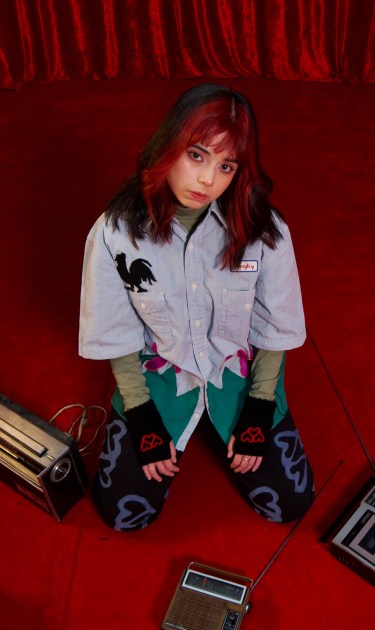When Mexican singer-songwriter Bratty hit the airwaves with her folky, self-produced 2018 EP Todo está cambiando, she couldn’t have predicted how accurate that statement would turn out to be. The ethereal shoegaze of lead single “Aquí” instantly resonated with a generation of norteño kids who’d grown up listening to banda and corridos but wanted to express themselves in a more stripped-down musical language. This was also a generation hungry for music and personalities that felt more real than the usual social media-strategic products. Bratty and Daniel Quién in Sinaloa, Ed Maverick and Kevin Kaarl in Chihuahua, and Señor Kino and Margaritas Podridas in Sonora, all harnessed confessional lyrics and adventurous sonic canvases ranging from folk to psych and grunge.
Among her peers, Bratty — who was born Jenny Juárez in Culiacán — also proved the most malleable when it came to embracing radio-friendly pop structures. Since her 2018 breakout, she’s delved into twangy dance pop with Metronomy on “Things will be fine,” found her psych-pop groove with Cuco on “Fin Del Mundo,” and even linked up with Puerto Rican trap and perreo god Álvaro Díaz for the ambient introspections of “Shh.” Earlier this year, she unveiled a guest-filled mini-album titled Es Mi Fiesta Y Si Quiero Hago Un EP, which also dipped into post-punk alongside Depresión Sonora, garage with Hinds, and 4/4 pop with Méne and NSQK. So amidst label-made collab saturation, it makes sense that her new album TRES is a quintessential return to basics. The ascendant Sinaloan star has trimmed the guest list and reverted to her primary songwriting instincts, perfecting the essence of Bratty’s catchy angst-pop.
“With [TRES], I tried not to overthink my writing,” Bratty tells Remezcla, speaking from Universal Music headquarters in Mexico City. “Since more people started listening to my music, I felt the pressure to make hits. But for this record, I decided to let go of all that and return to the sounds I loved when I first got into music — of course, improving sound quality and injecting some new elements. Julián Bernal [producer for Elsa y Elmar and Esteman] helped me achieve that vision, and in a way, it was like going into an amusement park and having a blast.”
The promotional singles for TRES were masterfully selected, leading with the euphoric anxiety trip of “Radio.” Here, Bratty dissects her celebrity status in a media ecosystem that shoehorns artists into predetermined narratives and reduces their work to pointless comparisons that wreak havoc on their mental health. “Mi mente miente cuando dicen mis virtudes / sé que hay alguien más llenando multitudes,” she coos, battling intrusive thoughts over the peppiest pop-punk you’ve ever heard. On twee slow-burner “Estos Días,” she meditates about spending more time on the road than in her own bed, permanently counting steps, and watching loved ones slip through her fingers under the breakneck pace of her career.

These professional and existential insecurities fit right in with their equally gutting romantic counterparts. In “Ya No Es Lo Mismo,” the silence between two people in a crumbling relationship is deafening, which in turn fuels the voices of doubt in Bratty’s head. The song was co-written with Monterrey pop crooner Billy Miamor, who also penned “La Última Vez,” a candid, relatable story about how unresolved breaks lead us to dwell on unhealthy patterns. “Otra vez es la última vez,” she sings to herself, angry and disappointed, seduced over and over by problematic text messages and cryptic social media posts.
“Since more people started listening to my music, I felt the pressure to make hits. But for this record, I decided to let go of all that and return to the sounds I loved when I first got into music.”
“I’m talking from my own artistic perspective, and I’m trying to be honest and genuine,” she says. “’Radio’ is about self-sabotage and how I don’t like being compared to other artists. And on ‘Agosto,’ I talk about seasonal depression and feeling sad without knowing why. I’m a melancholy person; it’s something that comes naturally to me. This record gets into anxiety, growing up, and uncertainty about the future. I feel like this album is closing out the chapter of my adolescence and asking the question of what comes next.”
Next is always a daunting destination, but Bratty shares that she may put out a full-on folk album or tinker with music from el movimiento in unconventional ways, like in her collaboration with Álvaro Díaz. TRES tackles that conundrum directly, notably on “¿Qué Será de Mí?,” where she teams up with Monterrey indie singer Ivana for a corrido-inflected lament. “El mundo ahora se ve tan distinto de cuando tenía 17,” they sing over dreamy ranchera guitars, simultaneously nodding to their respective upbringings in Northern Mexico, as well as música mexicana’s terraforming of the pop industry. On the album bookends “… Un Nuevo Disco” and “No Supe…, Bratty further reflects on the cards she’s been dealt, at first dreaming of a life worth writing a record about, and later grateful for the bizarre twist of fate that made creating therapeutic art a viable career.

“Album closers are always a letter to myself,” she confides. “’No Supe…’ came from a voice note I recorded in 2019, and I really wanted to finish writing it and include it in the album. Hearing it on TRES brings a tear to my eye since I think it perfectly expresses why I do what I do. Sometimes I feel like a little weirdo, but people seem to understand me. Honestly, I make music so I don’t ever have to explain myself.”
Listen to TRES below.




